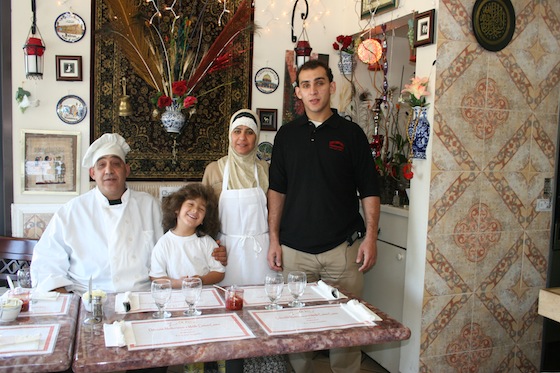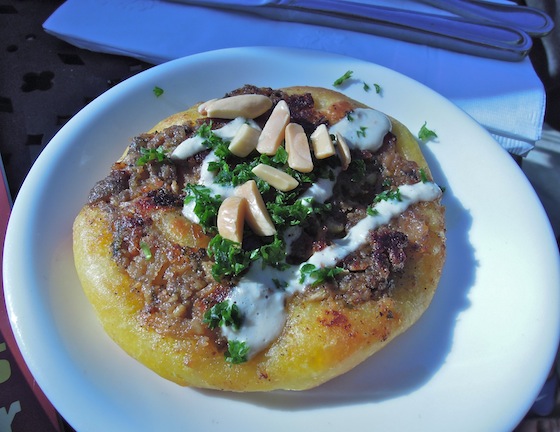Later he owned a liquor store, but Fayza admits she was always uncomfortable with that, since Islam prohibits alcohol -- and it is not served in their restaurant. When Kameem owned and ran the Halal Meat Market in Berkeley, Fayza worked as a butcher, carving up goats and sides of beef. Then medical problems and the economic downturn hit the family hard. They lost everything. “But,” said Kameem, “ you can’t give up. There is always opportunity. When one door closes another opens.”
The door leading into their dream restaurant did not swing open without a lot of faith and hard work. This spot on the Berkeley-Albany border was a KFC when the family first noticed it, which was then replaced by a string of other eateries that all went belly up. The jinxed spot has been variously, a donut shop, Chinese, Korean and African restaurants.
The day in 2008 that Naiem found a tiny “For Sale” note taped on the door, the abandoned property was dark, damp, littered, and an impromptu, open-air dorm for homeless people. “The place was in such bad shape,” Kameem recounted, “that everyone told me I was a fool to buy it.” But the challenge appealed to Kameem and he and his family toiled everyday for 8 months to clean and remodel it. “We filled dumpsters the size of elephants with trash,” he recalled.

Neighbors first tried to discourage them, saying that given the spot’s history, they would be too afraid to frequent the new cafe. But as the Ayyads installed patterned tile walls that reminded them of home, and made the space cozy and inviting, local residents started rooting for them.
One day when it looked like the remodeling was complete, the neighbors couldn’t wait any longer and lined up at the front door for lunch, even before there was an official opening. Fayza wasn’t quite ready yet and just made them salad, chicken and pot after pot of rice, since she had no idea how much people were going to eat. Slowly, she started adding dishes to the menu, familiar Middle Eastern fare, like hummus, falafel and shawarma, but with Fayza’s special spin. Their standout dish has always been the organic, rotisserie chicken, marinated in olive oil, lemon juice and vinegar and rubbed with Fayza’s secret blend of spices.
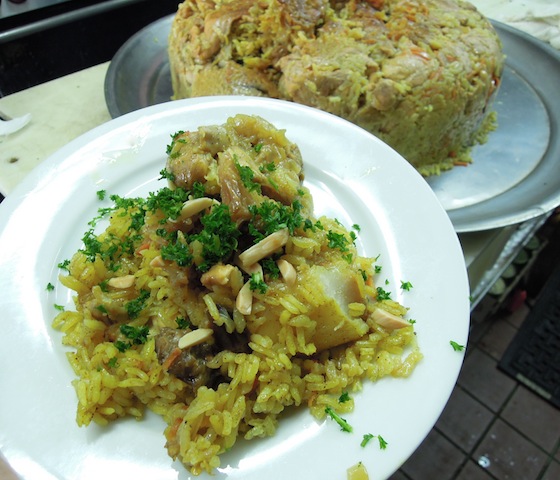
All this talk of chicken made me hungry and I asked about Maklouba, one of the daily specials. “This is a Jordanian-Palestinian dish that we eat at home every Friday. It literally means upside-down,” Fayza said as she invited me into the kitchen where she and daughter Layla, who serves as kitchen manager and cook, took a huge pan layered with chicken, vegetables and rice out of the oven and gently turned it over onto a giant platter to offer me a bite of the warm mélange.
Fayza, who had a Moroccan father and Palestinian mother, explains that this dish is usually eaten with the hands. Since I just wrote a post about eating with the hands, in which I got a lesson in Moroccan right-handed dining, I felt prepared. But Fayza says that common practice in her culture is to wash the hands, but leave them wet (perhaps because this avoids any worry about unclean towels?)
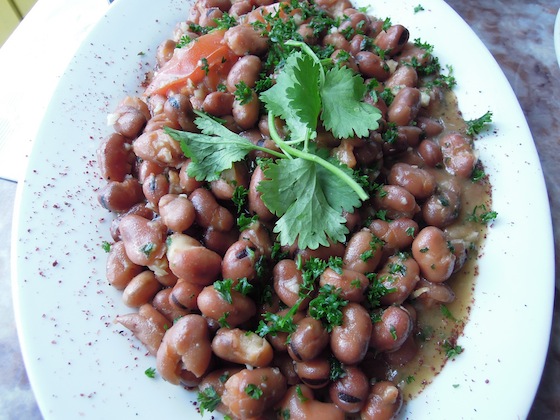
The maklouba, like the spheeha and other nightly specials I tasted in the next few days are homey, hearty, unfussy, satisfying dishes. Besides familiar salads of cucumbers and tomatoes (with feta, tahini, or red onions) dressed in olive oil and lemon, a few salad items were new to me: Mudamus, creamy poached fava beans with stewed tomatoes, which Layla informed me is a breakfast staple.
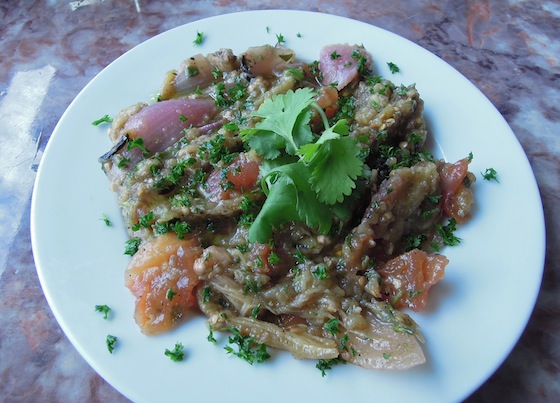
And Mashweeya, a grilled vegetable salad that Layla explained is usually a summer dish, enjoyed by the family standing around the hot grill. The plate of smoky eggplant, tomatoes and garlic with olive oil was so flavorful, that I tasted a hint of summer, even on a rainy March day.
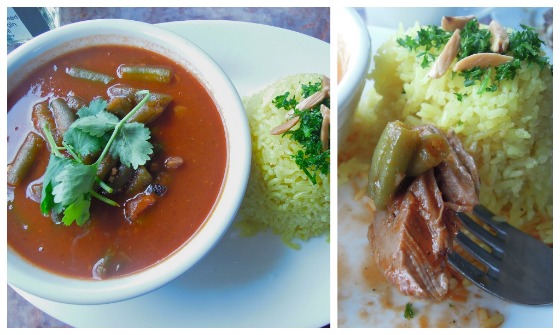
The nightly specials are a big draw at Zaki, even with the ninety-five percent non-Middle Eastern clientele. Son and business manager, Ramzy, says,
“Many of our customers are well-traveled people who have tasted these foods on trips. We also get fourth or fifth generation Lebanese, for example, or someone who remembers the way their Persian grandma made lentils.”
Lamb is a key ingredient in dishes traditionally served on special occasions and at Zaki, the lamb is so tender it falls apart if you but glance at it. In Fasoulia, the Tuesday night special, it is cooked with green beans stewed with garlic and tomato sauce.
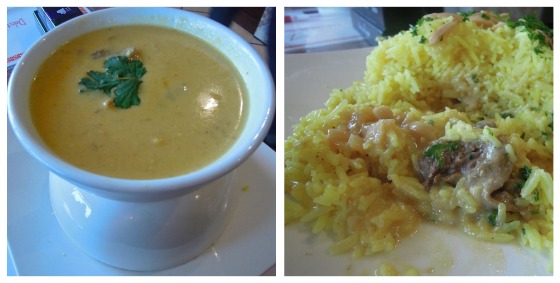
In Mensaf, the Saturday night special--that always sells out--the lamb comes in a bowl of creamy sauce of yogurt, sautéed onions and lemon juice that one pours over a dome of Jasmine rice and yogurt-soaked bread.
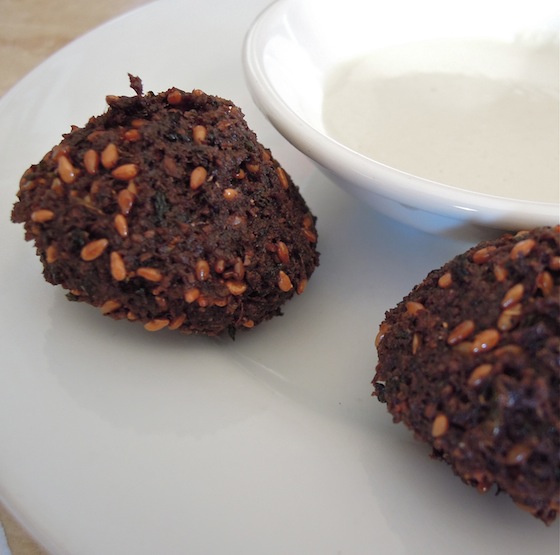
As she brought me a plate of her zesty, spiced falafel to try, Fayza confided that the headscarf she wears seems to attract cultural projections. When she attended Contra Costa College 20 years ago, she was the only student with such a head covering.
“They called me Mother Teresa,” she recalled. “And they wanted me to change my name to Liza, and my husband to change his to Dan. Can you imagine us, ‘Liza and Dan?’ But no way, I’m not changing. I stay true to myself," she said as she graciously poured me another cup of mint tea.
